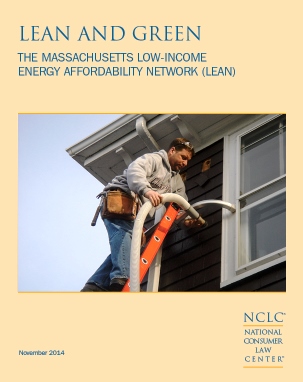The Massachusetts Low-Income Energy Affordability Network (LEAN)
The Massachusetts Low-Income Energy Affordability Network (LEAN) is an association of nonprofit agencies that coordinate the delivery of government and utility-funded energy efficiency services to low-income utility customers throughout Massachusetts. Since 1997, LEAN’s member agencies have delivered energy efficiency upgrades to more than 100,000 low-income Massachusetts households. Still, up to 200,000 low-income homes still need energy improvements. LEAN helps utilities to achieve their energy savings goals and the state to reach its greenhouse gas reduction targets while providing green jobs for local workers and boosting local economies. This report recaps the successes of the network and offers a model that other states can adapt.

Download the full report (PDF)
Download the full executive summary (PDF)
Video: Solar hot water for MA elders in public housing
Related Publication Guide to the Rights of Utility Consumers, Published Nov. 6, 2014 © National Consumer Law Center
Quick Facts
- Massachusetts rank among states for energy efficiency: #1 (2011 – 2014)
Source: American Council on an Energy-Efficient Economy, Energy Efficiency Scorecard - Number of low-income homes in Massachusetts that the LEAN network has weatherized since 1997: Approximately 100,000
- Estimated number of low-income homes that still need to be weatherized: Up to 200,000
- Number of Community Action Agencies (CAAs) that deliver the energy efficiency services for the LEAN network: 12 lead agencies; more than 20 subcontractor CAAs and other nonprofits
- Amount that Massachusetts sends out of state annually for purchasing fuel to heat people’s homes: $5 billion
- First fiscal year in which Massachusetts began supplementing the federal Weatherization Assistance Program with state funds: 1981
- Nationally, the percentage of total potential energy savings through low-income homes: 19%. Source: McKinsey
Key Points
- LEAN delivers low-income energy programs and represents low-income utility customers in legislative discussions and regulatory proceedings.
- LEAN leverages multiple funding sources and aligns different program rules to comprehensively serve low-income households in an efficient manner.
- LEAN hosts regular Best Practices Working Group meetings (comprised of representatives from each utility and nonprofit member agency) to continuously improve the program and share ideas.
- LEAN helps local contractors by monitoring training needs and providing training, developing common pricing, and expanding work opportunities.
- LEAN can serve as an incubator for testing new products (such as domestic solar hot water heating and combined heat-and-power systems) or programs (such as the arrearage management program, which helps customers manage overdue utility bills).
Can LEAN Be Replicated in Other States? Key Points to Consider
1. Those working to build a network similar to LEAN should work closely with the state weatherization agency as its support is likely critical to success.
2. A successful low-income network should ensure it has access to the experts needed to carry out its work.
3. It is helpful if utilities and their state utility regulators, as well as other state energy policymakers, are openly supportive.
4. Utilities that operate energy efficiency programs need to know that they will recover expenditures they make on energy efficiency and have the opportunity to earn a profit commensurate with their other activities.
5. The local nonprofits that wish to launch a state-wide network must deliver high-quality work.
6. The nonprofit agencies that will have to lead the charge must be tenacious and patient.
